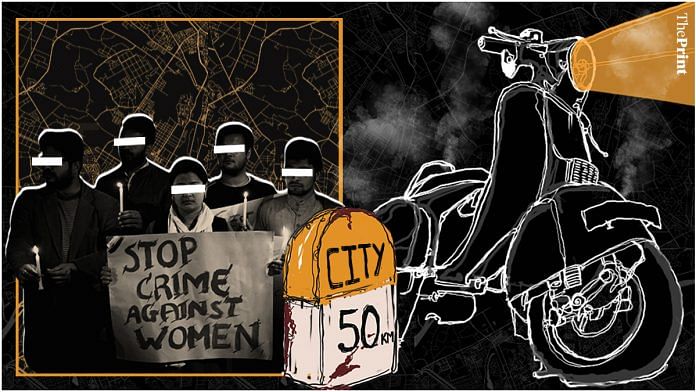The horrific gangrape-murder of a vet in Hyderabad last week triggered a national outrage, mirroring anger unleashed after Delhi’s 2012 Nirbhaya case. But other recent cases of sexual assault that occurred away from big metropolitan cities — a class 11 student in Coimbatore and a law student in Ranchi — didn’t see a similar fury.
ThePrint asks: Hyderabad horror: How can we bring national attention to rape cases outside big cities?
We avoid facing our complicity as a society in perpetuating the rape culture in India
Kavita Krishnan
Secretary, All India Progressive Women’s Association
I would reframe the question to ask “How can we bring attention to grisly rape cases that aren’t sensationalised, especially where the victim has been killed?”
Whether in cities or small towns, rape cases where the victim has named her assailant often get far less attention. The tendency is to blame the survivor. Such cases elude society and media’s attention and the government hardly provides any support. Even cases of rape and murder don’t get enough attention while the accused walk the streets with impunity.
This usually happens when an entire institution stands accused, such as the 2004 Thangjam Manorama incident where a group of Assam Rifles soldiers gang-raped and killed a young Manipuri woman. Fifteen years on, the perpetrators have still not been brought to justice.
When we focus only on certain cases, we ignore the systemic nature of sexual violence. We avoid facing our own complicity as a society in perpetuating the rape culture in India. By demanding that rapists in one or two cases be hanged, we seek to reassure ourselves that we are a righteous society where rapists are an aberration.
We don’t want to face the fact that the violation of consent — rape — is normalised in Indian society. The answer lies in focusing on structures of power and systems that perpetuate victim-blaming.
Protests alone won’t help. Only a national campaign with govt and citizens’ involvement can end rape menace
 Kalpana Vishwanath
Kalpana Vishwanath
Activist and co-founder of Safetipin
Newspapers and TV channels certainly report rape cases from across the country. Social media plays a big role in highlighting such cases, irrespective of whether they happen in metropolitan cities or in small towns. So, I don’t think it’s correct to say that we outrage over rape cases only when they happen in big cities.
We should definitely have a nationwide awareness campaign, something along the lines of Swachh Bharat or Beti Bachao Beti Padhao. The campaign should address women’s right to a violence-free life. Social change is possible if the government shows seriousness and extends its support. We need to move beyond the knee-jerk reaction of demanding death penalty for every rapist. Doing so has brought us down to uttering platitudes.
We desperately need a more serious and concerted effort in ending this social menace. Besides the government, many other institutions will have to come together to address this, most importantly families.
While education does play an important role, I don’t see anything other than a national campaign than can effect such a change. You and I or some women’s group protesting on the streets won’t do much beyond registering the anger. India needs more concentrated steps where the government categorically says that this is unacceptable. We have to put all our effort and resources to make it a national issue.
Also read: Disha is the new Nirbhaya as Telangana police tell media not to name Hyderabad rape victim
If law and order is not in place, no amount of protesting will help us deal with cases of rape
 Kavita Bundelkhandi
Kavita Bundelkhandi
Editor, Khabar Lahariya
In Uttar Pradesh’s Bundelkhand, where I live, nearly 4-10 cases of rape are reported every month. What happened in Hyderabad is very wrong, and I strongly condemn it. When a poor girl, or a Dalit, tribal, or a Muslim girl is raped, the society reacts differently.
Two years ago, a girl from a poor background was raped and thrown in a ditch in my area. But no legal step was taken. The girl’s family was forced to keep quiet. In such cases, the family wants the case to be taken up legally. But there is no provision. The local community tries to keep the matter under wraps as much as possible out of fear of getting their locality’s reputation tainted.
When an incident such as the one in Hyderabad or Delhi happens, everyone comes out to protest. So why not for women from the lower class? We keep quiet because we perhaps consider these as ‘small’ cases. If we raise our voice in all cases, it will lead to change. But it is very difficult.
I’m not in favour of death penalty. I believe we should first strengthen the primary steps such as filing an FIR timely and so on. Here in Uttar Pradesh, the victim is asked to first produce evidence that she was raped. That is where we are stuck. If law and order is not in place, no amount of protests will help us.
There’s a practice of promoting the culture of silence, be it marital rape or those by men in uniform
 Kavita Srivastava
Kavita Srivastava
National secretary, PUCL
It takes a lot of effort for young girls and women to break their silence on sexual violence and rape. In majority of cases, rape is committed by someone known to the woman. The police, the judiciary and the state machinery together make it difficult for the survivor to seek justice.
In the past, the media highlighted institutional injustice, and Parliament and state assemblies took up these issues. But today, all are actively promoting misogyny and are responsible for perpetuating the rape culture. The Association for Democratic Reforms revealed in 2018 that the BJP had the most number of MPs accused of violence against women.
Rape has been the oldest political tool in history to humiliate the ‘enemy’. The media doesn’t report cases when caste Hindus rape Dalit women; when tribal women of Bastar are labelled Maoists and raped by paramilitary forces; or when women in the north-east and Kashmir are subjected to sexual violence and rape by Indian Army personnel.
Can cases like that of Manorama’s or Kunan Poshpora or Shopian or even Soni Sori’s ever see a national andolan like what we are witnessing today in Hyderabad? Why calls to publicly rape women in Kashmir or dead Muslim women aren’t criticised?
Also, what about marital rape? There is a complete silence on it because society won’t question the institution of family, which has to be kept together at any cost. This is a refrain of the same nationalism that does not let you question rape of women by men in uniform.
Also read: ‘They punctured her scooter & waited’ — how 4 men executed horrific Hyderabad rape-murder
By Taran Deol, journalist at ThePrint





Regarding institution of family and marriage, kavita should concentrate on Muslim women who face evil like triple talaq and Burqa veil.
Kavita Srivastava and krishnan should know faux cases harm the genuine cases more. In JK many times faux cases are made on security personnel.
Anyways, PUCL should also know that in the last three recent cases of rape including kaushambi one, hyd one the prime accused was Muslim.
It was bewildering to see our law makers reacting the way they did. This is horrific and must be condemned and preventive measures for future incidents be contemplated. But we should remember that every society has its share of criminal elements irrespective of caste, religion, class etc.
It is strange to see how the respondents manage to communalize this crime. One bemoans that outrage is not seen when caste Hindus rape dalits. Another bemoans that indian society has a rape culture. Can any recent example be given of a caste Hindu raping a dalit? On the other hand, of the four recent rape cases in the media, three were committed by Muslims on Hindus including on dalits, including a gang rape of a dalit by a trio of Sheikhs and a double murder, child rape and necrophilic act by a Naziruddin. So now, what prevents the so called liberals from complaining the ‘rape culture’ of Muslims against Hindus?
It’s rather difficult in country like India full of varieties in its land, culture and what not. Awakening is the necessity of the nation. Edn. socioeconomic status, Gender equality & equity are thresholds. Political will, good governance , moreover the fourth Poll of democracy the media exceptionally covers news outside metro cities. The police all the time involved in law & order movements politically motivated. So effective system changes in all the above can create a good automospher
As happened for Kathua, the responsibility will have to be taken by the national media, led by TV channels. Keep the focus relentlessly on each particularly numbing case. Nurture a stronger societal anger and revulsion, which can both pressurise state governments to act and also result in the sort of introspection and churn which can lead to less depraved behaviour.